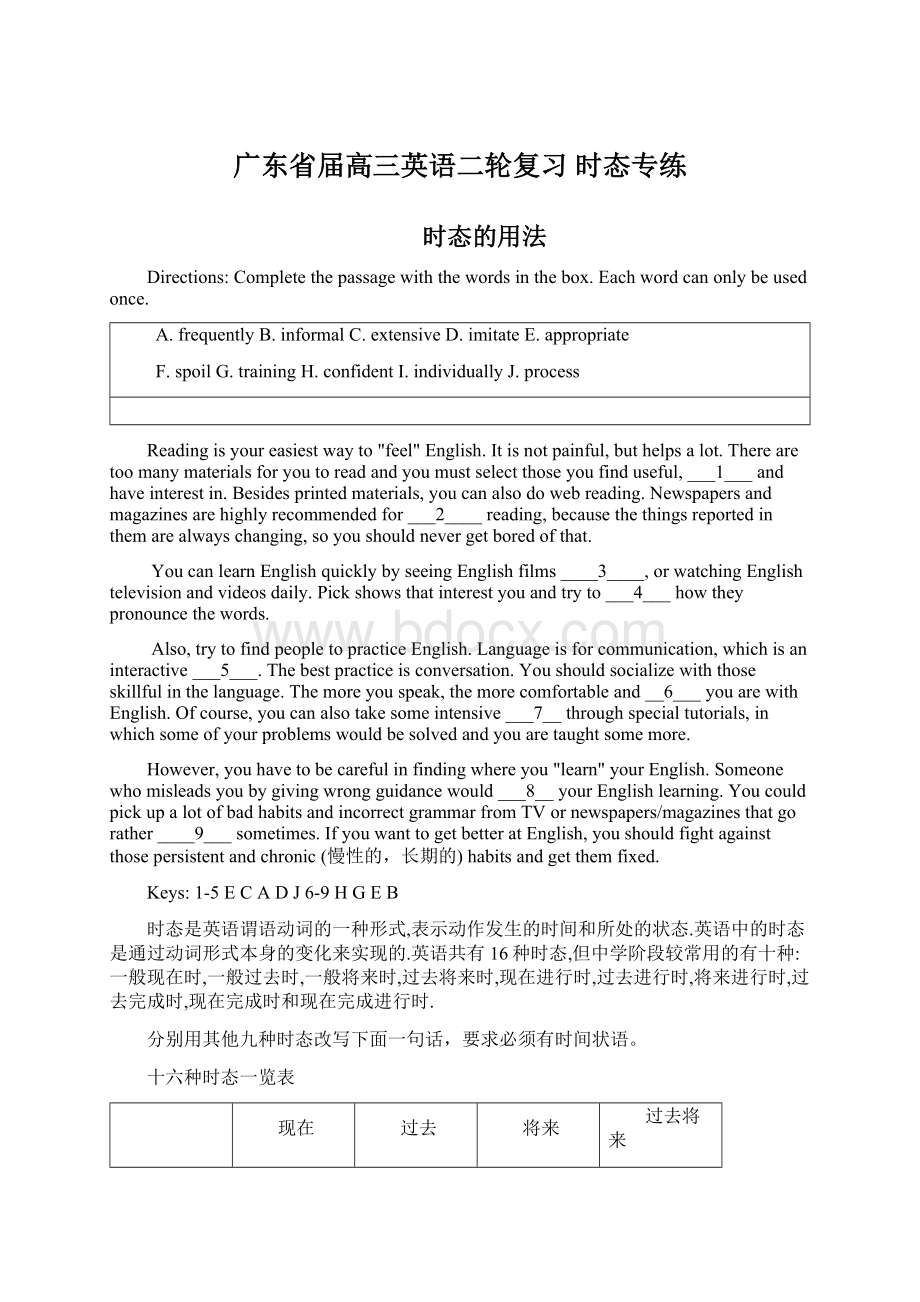广东省届高三英语二轮复习 时态专练Word文件下载.docx
《广东省届高三英语二轮复习 时态专练Word文件下载.docx》由会员分享,可在线阅读,更多相关《广东省届高三英语二轮复习 时态专练Word文件下载.docx(14页珍藏版)》请在冰豆网上搜索。

一般现在时
work(s)
一般过去时
worked
一般将来时
shall/will+work
一般过去将来时
should/would+work
进行
现在进行时
am/is/are+working
过去进行时
Was/were+working
将来进行时
shall/will+beworking
过去将来进行时
should/would+beworking
完成
现在完成时
have/has+worked
过去完成时
hadworked
将来完成时
shall/will+haveworked
过去将来完成时
should/would+haveworked
完成进行
现在完成进行时
have/hasbeenworking
过去完成进行时
had/beenworking
将来完成进行时
Shall/will+havebeenworking
should/would+havebeenworking
Presentation-时态
一、一般现在时
用法
例句
1.表示经常性,习惯性的事件和行为,或存在的状态.常与usually,always,often,sometimes,everyday,onSundays等时间状语连用
Iusuallygotoschoolat8inthemorning.
SchoolopensinSeptembereveryyear.
2.表示主语目前的特征,性格,状态和能力
Iamateacher.
Doyoulikeswimming?
3.表示客观事实,普遍真理,格言等,不受时间限制的客观存在
引用书籍,报刊,作者的话
Thesunrisesintheeast.
Theearthgoesaroundthesun.
Leninsaysthatwithouttheworkingclassthesocialistrevolutioncan’tbesuccessful.
4.书刊标题,球赛现场报导,小说的情况介绍一般用现在时态
TheBiblesaysloveofmoneyistherootofallevil.
Thestoryissetinthespringof2009.
5.在时间,条件,让步状语从句中表示将来的动作或状态
Iwilltellhimaboutitassoonashecomes.
Ifitisfinetomorrow,we’llgoshopping.
6.用于表示计划,时间表要发生的动作(句中常有时间状语);
表示往返位移的动词:
arrive,come,drive,fly,go,leave,move,return,ride,sail;
表示开始结束的动词:
begin,close,end,open,start,stop
Thetrainleavesatnineinthemorning.
WeleaveforShanghainextSunday.
7.代替过去时态,仅限于say,tell,hear,learn等少数动词用语转述别人不久前对自己说过的话,尤其是所说的情况现在还存在。
Myfriendstellmethatyou’vebeenunwell.
Ihearyouwantasecretary.
二、一般过去时
1.表示过去发生的动作或存在的状态,常与表示过去的时间状语连用yesterday,lastweek,threeyearsago,thedaybeforeyesterday,onceuponatime,in2008.
Heboughtanewbikeyesterday.
Heworkedinafactoryin2006.
2.表示过去经常或反复发生的动作,常与everyday,often等时间状语连用。
usedto+动词原形/would+动词原形表示过去经常反复发生的动作。
Iusedtogetupat6whenIwasinthecountryside.
Wewouldasktheteacherforadvicewhenwehadtroublewithourlessons.
3.用于对已去世的人的情况描述。
/描述主语过去的特征和性格
Edisonwasagreatinventor.
Whenhewasachild,hewasverynaughty.
4.在虚拟语气中,用过去时表示现在。
It’stime/Iwish/I’drather+从句(一般过去时表现在)
It’stimeyouhadaholiday.
Iwishyoulivedclosertome.
I’dratheryoudiditnow.
5.过去时和ever,never,once连用,表示过去的经验。
Didyoueverseealion?
Sheneverheardsuchabeautifulsongbefore.
6.代替过去完成时(由于before和after已经表明了时间先后,所以用一般过去时代替过去完成时。
Hedidnothingbeforehewenttobed.
Itoldthemafteryouleft.
7.在时间,条件,方式,让步状语从句中表示过去将来的动作。
Hetoldmehewouldgotothezooifitwasfinethenextday.
Hesaidhewouldtellheraboutthenewsassoonashemether.
三、一般将来时
1.表示将来的动作或状态,常与tomorrow,nextweek,soon,in(the)future等表示将来的时间状语连用。
Iwillgotothemuseumtomorrow.
Shewillfinishthetasksoon.
2.表示将来会经常发生的动作
FromnowonIwillcometoseeyoueveryweek.
3.表示按计划或打算将要发生的事情。
I‘mgoingtoswimthisafternoon.
一般将来时态表示法:
1)Shall/will+do表示不含主观因素,单纯表示将来。
Mybirthdayiscoming,Ishallbe19yearsold.
2)begoingtodo表示计划安排好的动作。
或根据目前的情况判断某事即将发生,意为“将要,就要”。
Lookattheblackclouds.Itisgoingtorain.
Heisgoingtoswimthisafternoon.
3)betodo表示“正式安排”要在将来做的事,意为“预定”,常用于通知,规定,正式的命令或指示。
ThemeetingistobeheldonFridaymorning.
Thepresidentistoholdanofficialreceptionforthevisitors.
4)beabouttodo表示即刻就要发生的动作。
后面一般不接将来时间状语。
Iwasabouttogoout,whenthetelephonerang.
Comeon,thecheck-indeskisabouttoclose.
5)一些瞬间动词的一般现在时,现在进行时或将来进行时可表示计划或将要发生的动作。
常用的动词有go,come,start,arrive,return,begin,leave,sail,move.
Oursummerholidaybeginsinthreedays.
Theprofessorisgivingatalkthisafternoon.
6)bedueto+动词原形,表示“定于(某时做某事)常与时间状语连用。
I’mduetograduateinthenexthalfoftheyear.
7)beonthepointof(正要…时候),belikelyto(有可能要),besureto(必然会)都能表示将来.
Wewereonthepointoftelephoningyouwhenyourtelegramarrived.
Theyarelikelytoarrivebeforeseven.
四、过去将来时
1.过去将来时表示从过去的某时间看来将要发生的动作或存在的状态,用would+动词原形构成
Hetoldmewewouldhaveameetingthenextday.
2.Was/weregoingto+动原,表示过去的预见或意图。
也表示计划没有实现
Iwasgoingtoplaytabletennisthatafternoon.
3.Was/weretodo,was/wereaboutto表示计划,安排将在过去将来要发生的事情。
AsIwastoleavethenextday,Iwenttobedearly.
4.Was/were+现在分词
HesaidhewasleavingforBeijing2dayslater.
5.Was/wereto+havedone表示原打算,原计划或本应当做的事没有做或没有发生。
IwastohaveseenhimlastWednesday,buthedidn'
tcome.
五、现在进行时
1.表示动作正在进行,持续。
可与now,atpresent,atthismoment,thesedays等时间状语连用,也可以不用时间状语。
Heiswritingnow.
Itisstillrainingoutside.
2.少数瞬间动词用进行时表示不断重复的动作
Heisjumpingwithjoy.
Someoneisknockingatthedoor.
3.少数动词用进行时表示一个人的临时行为.词类动词有:
live,work,study,stay,help
Idon’treallyworkhere;
Iamjusthelpingoutuntilthenewsecretaryarrives.
4.表示将来的动作或行为,这种动作或行为多半是安排或计划好的,常用go,come,leave,start,arrive,return,work,stay,do,have,wear等表示移动方向的词。
IwillbemeetingMaryduringChristmas.
Mymotherisstayingwithusforafewmonthsnextyear.
5.表示某种感情色彩。
经常与always,forever,continually,constantly.连用。
可表示厌恶,贬斥,表扬,赞美等。
Sheisalwayscomplaining.
WhenyoustudyEnglish,youmustnotalwaysbetranslatingeverythingintoyourownlanguage.
6.现在进行时态可以表示“关切,强调,礼貌,赞美。
Areyoufeelingbettertoday?
I’mtellingyouthetruth.
7.用于解释或归纳前面说的话。
WhenIsaysomebodyislazy,I’mnotreferringtoyou.
★以下词语通常不用于进行时态。
表示存在:
be,consist,contain,exist,remain.
表示拥有:
belongto,have=own,include,lack,possess
表示心理情感:
desire,dislike,envy,hate,like,love,need,pity,prefer,trust,want,wish.
表示思想和信念:
believe,doubt,expect,forget,imagine,intend,know,realize,recognize,remember,suppose,understand
六、过去进行时
1.表示在过去某一时刻或某一段时间正在进行的动作。
Iwasdoingmyhomeworkat5yesterdayafternoon.
2.动词go,come,start,leave,begin,stay,return,等的过去进行时可表示过去将来即将发生的动作。
HeaskedmewhenIwasleaving.
3.和一般过去时一起使用,用于描述一个动作进行过程中另一个动作发生。
IwaswatchingTVwhenmymothercameback.
4.与always,constantly,continually,forever连用表达某种感情色彩。
Mybrotherwasalwayslosinghiskeys.
5.描述故事发生的背景
Itwasadarknight.Thewindwasblowinghardandtherainwasfallingheavily.
★过去进行时与一般过去时的比较。
1.过去进行时表示过去正在进行的动作,而一般过去时表示一个已经完成的动作。
Hewaswritingabooklastyear.(此书可能尚未写完)
Hewroteabooklastyear.(已经写完)
2.过去进行时表短暂的动作,而一般过去时可用于表示永久性或较长久的情况。
IthappenedwhileIwaslivinginShanghai.
HelivedinParisduringhislastyear
七、将来进行时
1.表示将来某个特定时间要进行的动作。
Whatwillyoubedoingthistimetomorrow?
2.表示说话人感觉某事即将发生或预计要发生的动作。
Weshallbehavingameetinginaminute.
3.Willbe+-ing表示现在,will用作情态动词,有“揣测”的含义,可译为“大概”或“一定”,常与now连用。
They’llbewatchingtelevisionnow.
It’ssixo'
clock,Hewon’tbeworkingnow.
八、现在完成时
1.表示过去发生的某一动作对现在有影响,句中没有具体时间状语。
Ihavelostmywallet.(目前还未找到)
Ihavejusthadmylunch.(不饿了)
2.表示过去已经开始,持续的现在的动作或状态。
也许动作还将持续下去。
常和表示一段时间的时间状语连用。
如:
sofar,now,inthepastfewyears,today,thisweek,uptonow.
WehavelivedinBeijingfor5years.
Ihaven’tseeneachothersince2006.
3.现在完成时可用在时间和条件状语从句中,表示将来某时完成的动作。
I’llgotoyourhomewhenIhavefinishedmyhomework.
Ifithasstoppedsnowingintheafternoon,we’llgotothepark.
★现在完成时的特殊用法
1.主句用现在完成时,since后的用法。
Since+过去的时间点:
HehastaughtEnglishatthisschoolsince1998.
Since+一段时间+ago.Ihaven'
tseenhimsincethreeyearsago.
Since+从句(谓语用非持续性动词的过去式)Greatchangeshavetakenplaceheresinceyouleft.
Since+从句(谓语用持续性动词的过去式)Ihaven’theardfromSusansinceshelivedinShanghai.since从句用持续性动词,表示该动作已经结束。
(自从Susan离开上海以来。
)
Since+从句(谓语用现在完成时,常与be动词用)Shehasseldombeenoutsinceshehasbeenill.
2.现在完成时用于有序数词及theonly构成的句型中。
It/Thisis+thefist/thelast/theonly+名词+that+现在完成时
ItisthefirsttimethatI’veseensuchawonderfulbuilding.
It/Thisistheonlybookthathehaseverwritten.
3)现在完成时用于形容词最高级构成的句型中。
It/This